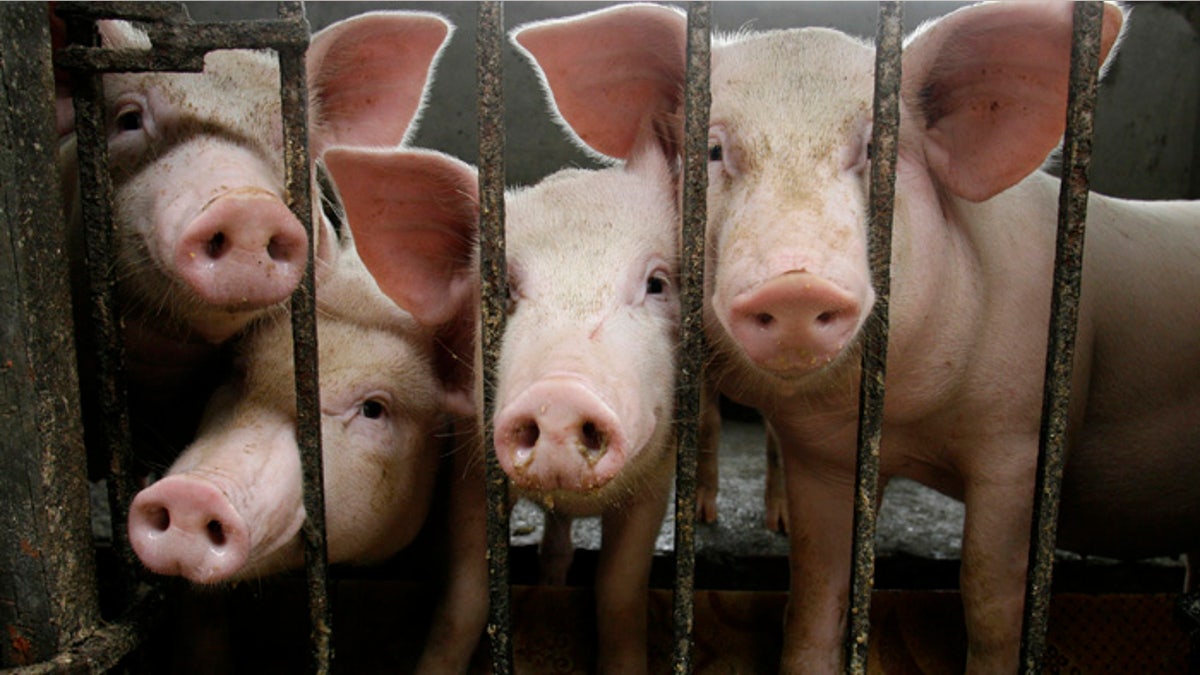
Pigs are seen inside their cage at a farm in La Ca village, outside Hanoi April 27, 2009. REUTERS/Kham (VIETNAM ANIMALS SOCIETY IMAGES OF THE DAY) - RTXEFD2 (REUTERS/Kham)
U.S. veterinarians are warning that outbreaks of a deadly pig virus will climb this autumn after a summertime hiatus, likely killing another 2.5 million pigs over the next 12 months and amplifying an increase in pork prices.
Concerns persist about the expected jump in infections of Porcine Epidemic Diarrhea virus (PEDv) despite assurances from U.S. Agriculture Secretary Tom Vilsack on Wednesday that the nation is likely "on the other side" of the disease due to approval of the first vaccine directly available to farmers.
Harrisvaccines, an Iowa-based company, developed the vaccine approved by USDA this week. But Joel Harris, head of sales and marketing, said there were uncertainties about how much the vaccine will thwart PEDv in cold weather.
"There could be situations where the virus could overwhelm the immunity of the herd," he said.
The spread of PEDv, which thrives in cold and damp conditions, has slowed due to warmer temperatures after peaking in February. PEDv does not threaten humans or food safety, according to the USDA.
"There is still plenty of disease out there and it will be back with a vengeance in the fall," said Eric Neumann, a veterinarian studying the transmission of PEDv.
The fast-moving virus has killed an estimated 8 million pigs, or about 10 percent of the U.S. herd, and helped lift retail pork prices to all-time highs around $4.10 a lb since it first was discovered in the United States in April 2013. Prices could reach $4.64 by December, said Ricky Volpe, an economist for the USDA.
A renewed PEDv outbreak could mean millions of dollars more in losses for U.S. pig farmers and further damage to international trade. Already, export markets such as China, Russia and Japan have restricted imports of live U.S. pigs due to PEDv.
From July 2014 to June 2015, another 2.5 million pigs could die, said Dale Polson, a senior veterinarian for pharmaceutical company Boehringer Ingelheim, describing the outlook as "cautiously optimistic."
Immunity in pigs and the control of transmission have greater potential than the new vaccine to sway the death toll, he said.
"Vaccines can serve a purpose of boosting existing immunity," he said. "The degree to which they're capable of doing so is a bit of a black box."
The National Pork Board is urging researchers studying immunity and transmission to move quickly to prevent PEDv from coming back strong in the fall.
Some pig herds have developed repeat infections, which was not expected. Researchers know the virus is transmitted through pig feces but animal feed may be a factor, too.
The latest USDA data show 7,250 confirmed PEDv cases. The number of new cases reported under a voluntary monitoring system slowed to 138 in the week ended June 7 from 142 in the week ended May 25 and 158 the prior week.
The USDA this month ordered farmers to report new cases and pledged $26 million to fight outbreaks.








































